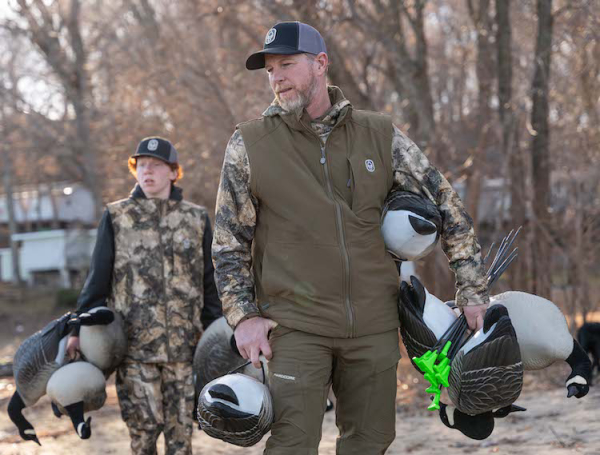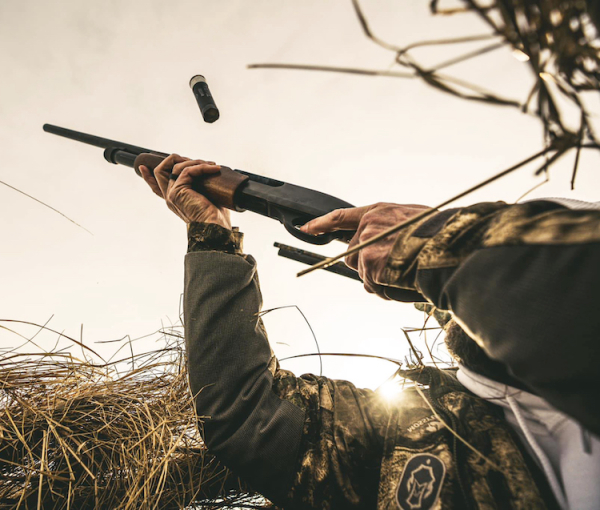

|
Early Canada goose and teal seasons are imminent (a few states have already opened resident only Canada goose seasons), so it’s time to check your waterfowl hunting kit – shotguns, boats, decoys, and blind bags, if you haven’t already. Following are ten go-time tips for hunters who are giddy for the most wonderful time of year.
ONE: Clean that filthy gun. Okay, okay, some hunters are good about gun maintenance, and the irons are tended to and spick and span right after the hunt – possibly stored much like a valuable archeological relic. Then there are the rest of us. Tear them down and get them ready for game day. This includes checking for magazine plugs and making sure said shotgun has the appropriate choke tube installed (remember you threw it in the corner of the closet the day after turkey season…).
Bonus Tip: Do. Not. Over-lubricate.
TWO: Check blind bags. This includes emptying them out and potentially a good wipe down of the interior. Oatmeal Cream Pies do not taste the same after being stored in the garage for six months – restock as necessary. But, more importantly, be sure it contains a headlamp, extra batteries, bug spray, backup calls…pretty much anything you may need should be in there.
Bonus Tip: Make a fully charged backup smartphone battery pack charger/cord a permanent blind bag item.
THREE: Do yourself a favor and wash your preferred hunting clothes. This includes sweatshirts, jackets, wader pants, etc. You may think you washed them after last season, but you probably didn’t.
Bonus Tip: Wash hunting clothes yourself to impress your mom or partner.
FOUR: Waders are often tossed into a corner or hung from the rafters in the garage after being used. Rarely washed or given a darn about, waders are likely the most ignored thing waterfowl hunters own, which is silly, considering how important they are for comfort. You can send warrantied waders in for repair, but I always figure nobody owes me or my abused waders anything and do it myself.
First, check for leaks and seal with Aquaseal – larger problems may require an actual patch of material over the issue, which can also be done with the assistant of Aquaseal. Hose the insides out and then spray the interiors (including deep into the boots) down with antimicrobial spray.
Bonus Tip: Purchase a wader dryer and use it religiously throughout the season and re-spray with antimicrobial spray as necessary.
FIVE: Be sure to take a serious look at your decoys and consider giving them a good scrubbing, and also address anchor/anchor-line issues, patch holes, touch up paint, and fix or replace torn decoy bags. This is also a great time to “get real” about replacing b-teamers for good. New decoys are just better. Always.
Bonus Tip: For additional info on decoy maintenance check out this article: Hardcore Decoy Maintenance
SIX: Go shoot! Yup, take your favorite shotguns out and get revved up at a clays range. Shooting “clay pigeons” behind grandpa’s barn is fine, but nothing replicates real time shooting scenarios better than a sporting clays range, or at the very least a skeet range. Do this after thoroughly cleaning your gun so it cycles efficiently, then tidy up as necessary. Don’t forget to adjust the choke appropriately and have the plug in the magazine prior to opening day.
Bonus Tip: Wear hunting clothes like what you’ll wear on the hunt to maximize real-time hunting conditions.
Bonus Tip 2: Pattern those new fancy designer loads you bought, so you know if they will perform well with your shotgun, and adjust accordingly.
SEVEN: Vehicle and trailer maintenance is often an on-the-fly endeavor because hunters wait until stuff breaks before they address it. How about some preventative maintenance. Check your trailer bearings thoroughly. If there is any question at all regarding their integrity, which is often hinted by a leaky rear seal, change the bearings and seals, or better yet, just swap the entire hub assembly out. For that matter, check your vehicle’s hub bearings, too. Unless you’ve roasted a trailer hub and smoked a spindle at o’dark thirty on your way to the boat ramp or field, you’ll have a hard time understanding how much it sucks. Same with the truck, check them or have them checked prior to the season. Grease trailer hubs as necessary with the best heavy-duty grease rated for marine applications. Don’t over-grease…which is very likely the #1 reason for trailer bearing issues.
Bonus Tip: Check your trailer tires pressure, and for cracks and excessive wear – air-up or replace as necessary.
EIGHT: If you have a retriever, be sure to do some easy, pre-season tune-up sessions, including both land and water retrieves. It’s never too late for a quick session but be sure to keep it light and fun. Also, it’s common for retrievers to freak out a little on opening day and sometimes the excitement leads to mistakes or less than ideal handling situations. Try not to freak out, they are in their glory, too, and the excitement is almost too much to handle. This is especially the case with younger dogs. Bonus Tip: Run drills with the same retriever stands and dog blinds you use while hunting to maximize realism. It may seem trivial, but the fact is it’s a lot easier for a retriever to get back into character when they are refamiliarized with normal hunting gear.
NINE: Be sure your licensing is all in order. This includes not only obtaining a Federal Waterfowl Stamp but also signing it – assuming you have a hard copy. While electronic stamps are now available, they’re not transferable so problem solved. Also, be sure you have your HIP# for each state you hunt in. Be sure it’s either listed on your electronic or printed copy and if not, you have it written down or saved in your smartphone memos. You’ll get a ticket for either of these mistakes if you get checked.
Bonus Tip: Create a folder in your smartphone with all your licenses and permits, so when asked, you’re organized. The CO has better things to do than wait for you to sort through 800 screenshots of funny memes and photos of “short” bass you thought were worthy of a photo.
TEN: Touch base with private landowners including any you lease from. This ensures there are no surprises and gives them opportunity to let you know if anything has changed as far as areas to avoid or new neighbors who may be an issue. Also, if you hunt public land, be sure you’re up to speed on the latest rules and regs of a given property. Most of the time this is available online, but occasionally, updates fall through the cracks, so a call to the property headquarters, or a better yet, a visit can save you a lot of headaches. Also, both landowners and property managers/biologists appreciate it when hunters are fully invested in preparation and obtaining information.
Bonus Tip: While they rarely take advantage of it, property owners appreciate it when hunters ask them if they need help with anything around the farm, etc. Gifts are fine and good, but nothing will ever trump sweat equity when they need another set of hands while working on something.